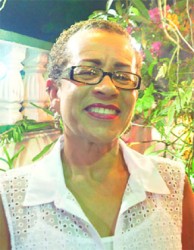Following the first visit to Guyana by delegates of the Caribbean’s Regional Anti-Doping Organization (RADO), for a Board Meeting and Results Management Training, sport federations and by extension all concerned citizens will be the beneficiaries.
This is according to Executive Director of the Organization, Tessa Chaderton-Shaw who conducted a seminar at the National Resource Centre on Friday.
Chaderton-Shaw stated that in the aftermath of the board’s visit “the 60 odd participants at the seminar will aid RADO’s cause by disseminating anti-doping education and liaising with our doping control officers and by extension there should be consistent anti-doping education across all sporting federations in Guyana.”
The Executive Director who was interviewed by Stabroek Sport Sunday night at a reception in honour of the delegates

then answered questions concerning the Barbados based Organization.
SS: What is RADO?
TC-S: First of all it’s the Caribbean RADO, the Regional Anti-Doping Organization
RADO is really a grouping of 15 Caribbean member states, this RADO is one of 15 across the world representing 119 countries and it basically groups countries in a given geographical space. The Caribbean RADO has 15 affiliates from as far north as the Bahamas all the way down to the island chain and Guyana and Suriname.
SS: How long has RADO been in power?
TC-S: RADO has been in existence since 2005, the Caribbean RADO started with five member countries but has grown incrementally to 15, it is based in Barbados and reaches across the region. We are responsible for anti-doping education, testing, we work very closely with ministries of sport, Olympic committees and national sport federations in an effort to keep athletes clean.
How does Guyana benefit from being an affiliate of RADO?
TC-S: First of all Guyana has been a long standing member of RADO, it pays membership fees both to the World Anti-Doping Agency (WADA) and to RADO, it benefits because it has a board member who sits on the RADO, Alfred King, the PS and it guides and educate athletes and federations about anti-doping.
SS: How wide spread is doping in the Caribbean?
TC-S: I cannot quote the figures, all that I would say to you that one positive test is one too many, we certainly know of two cases here in Guyana, they may be more but I know of two and they have been others across the region in Barbados and elsewhere.
Our mandate is to eliminate doping, to make sure that all athletes when they line up on the starting block that they are clean and that there is no cheating.
People will always find shorts cuts and a quick fix to enhancing their performance, so I firmly believe that education must underpin all that we do because once people understand the facts and know what constitutes doping and the sanctions that can be imposed that will be a factor, education is the key, we need to educate consistently. (Emmerson Campbell)




